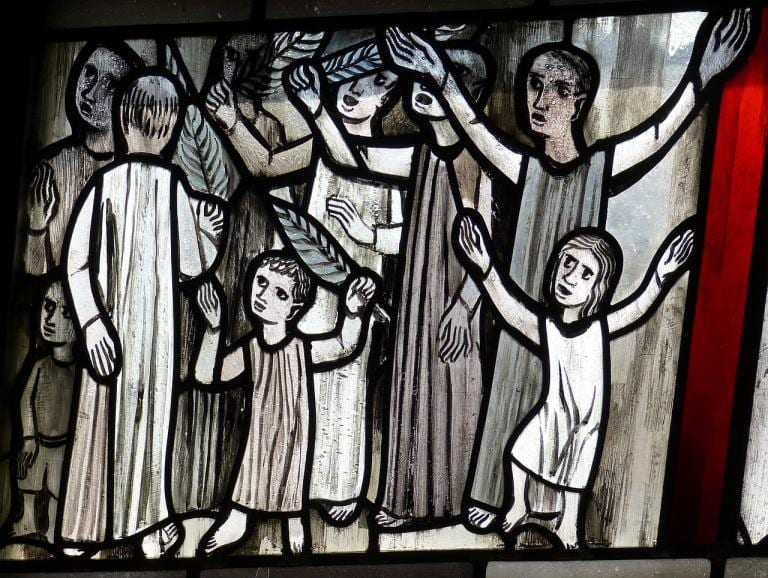With Palm Sunday begins what will be the strangest Holy Week of my lifetime. The music, the liturgical celebrations, the pomp and circumstance—all of these will have to be virtual and from a distance. It will be interesting to find out the creative ways that people find to connect without physically connecting. I’ll be leading a meeting of my Living Stones seminar on Zoom this afternoon; among other things, perhaps we will be swapping Palm Sunday and Holy Week stories.

The Palm Sunday celebration in a liturgical Christian church is both confusing and jarring. Everyone with a religious molecule in their bodies knows that Palm Sunday is about Jesus riding triumphantly into Jerusalem on a donkey (or colt), but this gets only about fifteen minutes of air time in the Palm Sunday liturgy. The priest reads the Palm Sunday gospel, the ushers distribute palms while everyone sings “All Glory, Laud and Honor” or something similar, the Old Testament reading, Psalm, and New Testament readings for the day are delivered, and then the liturgical transmission shifts from fifth to second without a clutch. Various assigned participants read the Passion story from the gospel du jour—this year it is Matthew—and the joy of Jesus’s triumphant entry transitions into the drama and tragedy of the Passion, ending with Joseph of Arimathea providing a tomb for Jesus’s body.
I remember a specific Palm Sunday liturgy from several years ago at Trinity Episcopal Church. It was particularly busy for Jeanne and me as she was scheduled as chalice bearer and reader, while I was subbing as lector for the originally scheduled person who was in San Francisco. I was disappointed to be assigned “Criminal Two” (the “good thief”) for the Passion reading (I was hoping for Pilate or Jesus); Jeanne got the centurion, a role played by John Wayne in “The Greatest Story Ever told” and by Ernest Borgnine in “Jesus of Nazareth.” I’m not sure if anyone notable has ever played Criminal Two. But at least my role had more words than hers.
My duties on that Palm Sunday began with my lector assignment—at Trinity, the lector reads the Old Testament reading for the day and leads the prayers of the people. Standing behind the lectern, I looked at the passage from Isaiah—the same passage from the Jewish scriptures for today—for the first time (usually I’m much more prepared), and read
The Lord God has given me the tongue of a teacher . . . Morning by morning he wakens—wakens my ear to listen as those who are taught.
Yes, God has, and yes, God does, if I’m listening. The more I do what I do, the more interested I am in where it comes from. I almost never ask the question “Why am I a teacher?” since I’m convinced that there is nothing else I would be happy doing. But the spring from which teaching bubbles up is of endless fascination to me, since on my best days in the classroom, the energy that connects all participants together in a web of discovery is clearly something I can neither manufacture nor completely control.
A few years ago, I raised some eyebrows on campus by giving a talk entitled “Erotic Pedagogy.” Although the talk was primarily focused on how my study of Simone Weil over the past many years has shaped my teaching, the title was inspired by Richard Rorty, who wrote about
The erotic relationships between teacher and student . . . reminding us that “love is notoriously untheorizable. Such erotic relationships are occasions of growth, and their occurrence and their development are as unpredictable as growth itself. Yet nothing happens in non-vocational higher education without them.
I understand why the Dominican priest who directed the on-campus center where I gave my talk received some questioning emails and phone calls about its advertised title, because out of context the idea of erotic relationships between professors and students on the campus of a Catholic college (or anywhere else) is indeed a bit disturbing.
But Rorty is right—what I do, and what I think all teachers should be doing, in the classroom is almost always more about love than it is about content, vocational preparation, “teaching to the test” or any other such thing. I want students to fall in love with texts, in love with the whole dynamic of learning, with the idea of never stopping the process of learning until they die. As I’ve been teaching classes on Zoom for the past two or three weeks, I have been seeking to duplicate this energy as much as technology and physical distancing will allow.
In my experience, the sparks of lifetime learning are best kindled by example. I almost never place a text on a syllabus unless I can remember some point at which it grabbed me, shook me up, and insisted that I pay attention. Continuing in his essay, Rorty writes that in order “to have inspirational value, a work must be allowed to recontextualize much of what you previously thought you knew;” inspired teaching
is the result of an encounter with an author, character, plot, stanza, line or archaic torso which has made a difference to the [teacher’s] conception of who she is, what she is good for, what she wants to do with herself: an encounter which has rearranged her priorities and purposes.
The characters, ideas and lines from such texts, which continue to rearrange my priorities and purposes as they regularly fill my classroom as well as spilling out of the confines of this blog two or three times each week, give shape and direction to an activity that is unlike any other—learning together. What I most appreciated about the lines from Isaiah that I read from the lectern on that Palm Sunday is being reminded of something that I too often forget. The whole process of teaching and learning, when liberated from my frequent well-meaning but misguided attempts to shape and control it, has divine energy behind it.
This all sounds idealistic and impractical in a world where the value of higher education is often exclusively identified as and judged according to the standard of focused (and very expensive) job preparation. Maybe so—practicality has never been my strong suit. But identifying the tools of lifetime learning and honing skilled use of these tools through engagement with the greatest texts that human beings have produced is an activity whose importance transcends the size of one’s future paycheck.
In an online New York Times commentary entitled “Why Do I Teach?” not that long ago, Gary Gutting, a philosophy professor at Notre Dame, went so far as to argue that far from directed preparation for the job market, the real goal of a college education is not even the passing of knowledge from teacher to student. Gutting writes that
We should judge teaching not by the amount of knowledge it passes on, but by the enduring excitement it generates. Knowledge, when it comes, is a later arrival, flaring up, when the time is right, from the sparks good teachers have implanted in their students’ souls.
Richard Rorty would have endorsed that sentiment, and so do I.
The most important part of Isaiah’s brief comment about teaching is the one that is easiest to forget or ignore—the Lord may have given me the tongue of a teacher, but often effective pedagogy depends on my not using it. “Morning by morning he wakens,” Isaiah tells us, “wakens my ear to listen as those who are taught.” Jeanne pointed out to me once that the word “listen” is made of the same letters as the word “silent.” Listening is perhaps the most important lifetime learning tool to become skilled with; it is definitely the most difficult. When I am sure that I know everything I need to know about a text or an idea walking into the classroom, I am laying the groundwork for a mediocre learning encounter.
Similarly, when I slog through a day never taking the time to be still and listen to anything—a bird outside the window, another person, the too-often-ignored little voice deep inside—I have frittered away a little more of the dwindling time I am given to never learning and growing. As I continue social distancing and hunkering down for the foreseeable future, and as I continue to engage virtually with my students on Zoom, it’s important for me—and for all of us—to pay attention to the things that we tend to ignore, to stop, look, and listen. We all just might learn something.













